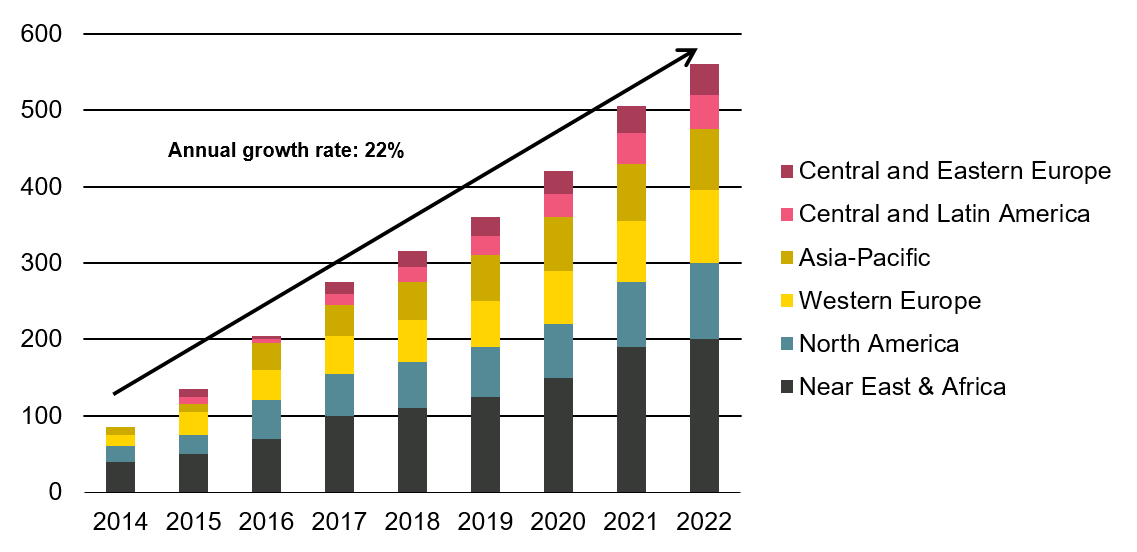"Impact Investing" is helping improve the world
Our world is facing a number of different environmental and social challenges, among them climate change and the scarcity of natural resources. Solutions in the areas of healthcare, education, financial inclusion and the environment need to be developed. Investors looking for ways to invest in the domain of “sustainability” have a wide range of possibilities.
Marketable solutions from private-sector companies aiming to achieve a positive environmental and social impact while generating a financial return in line with market expectations
In addition to the work being done by governments and non-governmental organizations (“NGOs”), many private-sector companies are also successfully tackling global challenges. Thanks to their economically viable as well as scalable business models, they are able to develop and sell sustainable products and services that contribute to a positive environmental and social impact. What’s more, by addressing these new sources of income and markets, they can generate attractive financial returns. From an investor's point of view, this is termed "Impact Investing": an investment approach that is complementary to philanthropic or charitable activities, which are usually geared only to bringing about a desired outcome, rather than meeting financial goals. Impact investors also pursue the objective of improving the world – and they do so through selective financial engagements.
The demand for these types of engagements is particularly pronounced among "Millennials" and charitable foundations, with double-digit growth in the amount of money they are investing every year. On the one hand, these investors are purchasing shares in listed companies with marketable solutions, i.e. companies achieving a positive environmental and social impact through the sale of their products and services. On the other hand, selected impact investors are grasping the opportunity to engage not through conventional stock market transactions but through the asset classes private equity and private debt. In doing so, they are able to invest in companies, or individual projects, that are solving specific environmental or social problems, while pursuing agreed impact targets. In order to achieve the greatest possible impact, these targets need to be measurable, and they must affect the poorest segments of the population.
A healthier world: access to healthcare and prevention
Access to good-quality healthcare is being made affordable thanks to technological advances, in particular through telemedicine. This is both time-saving and, with an applicable Internet connection, available 24 hours a day, whether the patient is at home or away. In the US, for example, compared to making a personal visit to a doctor, telemedicine reduces the average cost by 70%, a promising indicator that high-quality health care can become affordable for emerging economies as well. Beyond this, prevention also plays an important role. When it comes to eating healthier foods, consumer behavior can make a difference – for example, a shift from meat-heavy to increasingly plant-based nutrition has a significant preventive effect on the worldwide reduction of Type 2 diabetes.
Good-quality, affordable education opens up attractive career prospects
Online learning platforms and educational services – for example, online homework help, textbook rental, or online tutoring – are making good-quality education affordable for the children of low-income parents. They also increase students’ flexibility when it comes time to choose a career path, and they thus help their the chances of finding an attractive job.
Online education market in India (in billion USD)

Source: Statista (Prognosis: 2017-2022)
Escaping poverty through financial inclusion, affordable housing and social activities in the community
1.7 billion adults do not have a bank account – but 1.6 billion do own a mobile phone, and this can allow them, for example, to settle their bills via a mobile payment service. Many governments around the world are aware that the disruptive and attractive pricing character of fintech services is facilitating the financial integration of the underserved segments of their populations. The huge gain in efficiency especially benefits people living in remote areas, who can now pay their bills with just one click, or get loans via the relevant app on their mobile phone.
Growth in mobile payment services and loans (in billion USD)

Source: Technavio (Prognosis 2017-2022)
In addition, in emerging economies, migration to the cities is boosting infrastructure spending, while creating demand for affordable housing. Another way to alleviate poverty is through social activity. Implementing social programs to strengthen communal ties is a cornerstone of sustainable economies and societies.
Protecting the environment through clean energy, drinking water and efficient use of resources
According to the World Health Organization (WHO), air pollution causes 4.2 million deaths each year worldwide. According to Chinese government circles, China is addressing this problem by investing USD 360 billion between 2017 and 2020 in sustainable energy sources, such as wind and solar, in order to reduce pollution there. Eco-efficiency is also being increased through the use of fewer resources, such as water and energy, while waste (including plastic in the oceans) is being reduced through improved recycling methods.
Up to now, waste management has been largely ignored in emerging economies, even though it significantly improves living conditions, with appropriate sanitary facilities, clean drinking water, and reduced emissions. Conservation and biodiversity are also key issues in sustainable forest management, mitigating the problem of deforestation and the extinction of species.
Additional information
Would you like to know more about our megatrend “Impact Investing”? We would be happy to provide you with further information.








